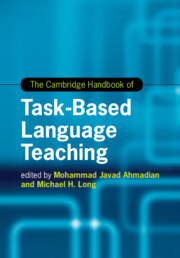Book contents
- The Cambridge Handbook of Task-Based Language Teaching
- Cambridge Handbooks In Language And Linguistics
- The Cambridge Handbook of Task-Based Language Teaching
- Copyright page
- Dedication
- Contents
- Figures
- Tables
- Contributors
- Preface The Origins and Growth of Task-Based Language Teaching
- Part I The Rationale for Task-Based Language Teaching
- Part II Tasks and Needs Analysis
- Part III The Task Syllabus and Materials
- Part IV Methodology and Pedagogy
- Part V Task-Based Language Teaching with School-Age Children
- Part VI The Teacher in Task-Based Language Teaching
- Part VII Task-Based Assessment and Program Evaluation
- 13 Task-Based Language Assessment
- 14 Evaluating Task-Based Language Programs
- 14A Comparing the Effectiveness of Task-Based Language Teaching and Presentation-Practice-Production on Second Language Grammar Learning
- 14B Examining High-School Learners’ Experience of Task Motivation and Difficulty in a Two-Week Spanish Immersion Camp
- 14C Designing a Classroom-Based Task-Based Language Assessment Framework for Primary Schools
- Part VIII Research Needs and Future Prospects
- Index
- References
14C - Designing a Classroom-Based Task-Based Language Assessment Framework for Primary Schools
Blurring the Lines between Teaching, Learning, and Assessment
from Part VII - Task-Based Assessment and Program Evaluation
Published online by Cambridge University Press: 19 November 2021
- The Cambridge Handbook of Task-Based Language Teaching
- Cambridge Handbooks In Language And Linguistics
- The Cambridge Handbook of Task-Based Language Teaching
- Copyright page
- Dedication
- Contents
- Figures
- Tables
- Contributors
- Preface The Origins and Growth of Task-Based Language Teaching
- Part I The Rationale for Task-Based Language Teaching
- Part II Tasks and Needs Analysis
- Part III The Task Syllabus and Materials
- Part IV Methodology and Pedagogy
- Part V Task-Based Language Teaching with School-Age Children
- Part VI The Teacher in Task-Based Language Teaching
- Part VII Task-Based Assessment and Program Evaluation
- 13 Task-Based Language Assessment
- 14 Evaluating Task-Based Language Programs
- 14A Comparing the Effectiveness of Task-Based Language Teaching and Presentation-Practice-Production on Second Language Grammar Learning
- 14B Examining High-School Learners’ Experience of Task Motivation and Difficulty in a Two-Week Spanish Immersion Camp
- 14C Designing a Classroom-Based Task-Based Language Assessment Framework for Primary Schools
- Part VIII Research Needs and Future Prospects
- Index
- References
Summary
This case study focuses on the design of an assessment framework for a task-based language syllabus for first and second language speakers in Flemish primary education. It describes the choices that the syllabus designers made with respect to task specifications, assessment criteria and teacher support. The case study shows how classroom-based task-based language assessment (TBLA) can provide teachers with rich, useful information about students’ progress in performing target tasks, and help them provide quality feedback to scaffold and advance students’ learning. Crucially, it illustrates how an integral TBLT-TBLA approach can integrate teaching, learning and assessment in a meaningful way.
- Type
- Chapter
- Information
- The Cambridge Handbook of Task-Based Language Teaching , pp. 585 - 602Publisher: Cambridge University PressPrint publication year: 2021



